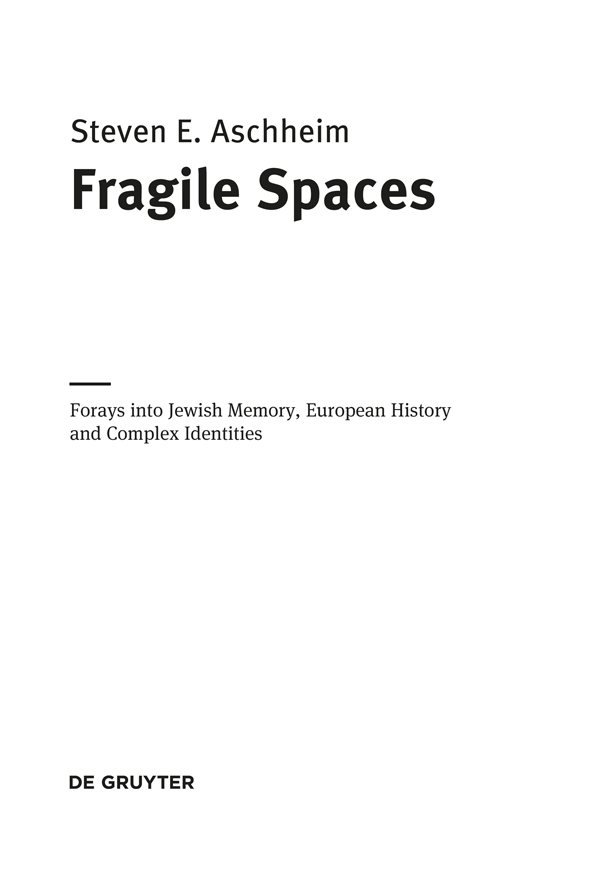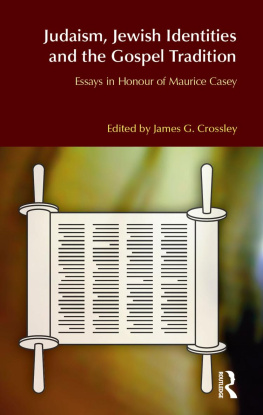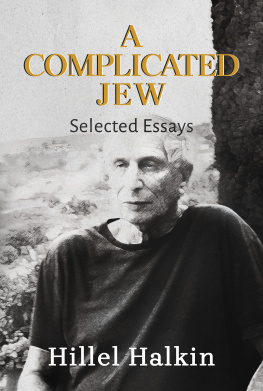Contents
Guide

Steven E. Aschheim
Fragile Spaces
Perspectives on Jewish Texts and Contexts

Edited by
Vivian Liska
Editorial Board
Robert Alter, Steven E. Aschheim, Richard I. Cohen, Mark H. Gelber,
Moshe Halbertal, Christine Hayes, Moshe Idel, Samuel Moyn,
Ada Rapoport-Albert, Alvin Rosenfeld, David Ruderman, Bernd Witte
Volume 8

ISBN 978-3-11-059545-1
e-ISBN (PDF) 978-3-11-059693-9
e-ISBN (EPUB) 978-3-11-059308-2
ISSN 2199-6962
Library of Congress Control Number: 2018951340
Bibliographic information published by the Deutsche Nationalbibliothek
The Deutsche Nationalbibliothek lists this publication in the Deutsche Nationalbibliografie; detailed bibliographic data are available on the Internet at http://dnb.dnb.de.
2018 Walter de Gruyter GmbH, Berlin/Boston
Cover image: Painting by Hannah Aschheim
www.degruyter.com

To my Present and (Hopefully) Future Grandchildren
Inheritors of a Delicately Fragile World
Preface and Acknowledgments
Collections of essays can be risky, uneven and possibly untidy, affairs. After all, in this case, most were written or commissioned for different occasions in various unrelated forums. Some are longer research and thought pieces while others are in the shape of shorter reflections that appeared in journals such as the Times Literary Supplement and the Jewish Review of Books . Hopefully they retain their relevance and freshness and in the Introduction I try to outline some of the connections between them. An additional justification for their appearance here, however, is the fact that a number of these essays have not been previously published or have only appeared in a foreign language. Similarly, as many of these other forays appeared in rather specialized, not to say obscure, forums, this may provide easier access to the interested general reader.
The organizational structure of the book is rather self-explanatory and reflective of my main areas of interest. I have updated, and in some cases inserted minor revisions (as well as re-titling a few of the essays). I have tried, as far as possible, to minimize repetitions. Where these still pertain, it is largely because these illustrate aspects related to different contexts and problems. Chapters have not been previously published. Details of the original publication of the other chapters are listed elsewhere in this volume.
Even if there is only one named author, the making of books is always a collective affair, made possible by many individuals on a number of levels. Over the years I have been extremely fortunate in having friends and colleagues too many to mention by name here who have shared ideas with me, coaxed me on in moments of doubt (if not despair) and, to be sure, corrected me on both matters of fact and conceptual substance. Should they happen to read some of the following essays, I hope that they will recognize their contribution. Their anonymity ensures that I alone am responsible for any of the errors or incoherencies that occur along the way.
There are, however, certain debts that cannot remain nameless. Patiently enduring my naggings, my editor, Katrien Vloeberg, has superbly unified an initially chaotic text, and spotted and corrected many substantive as well as stylistic issues. Her editorial skills, her attention both to detail and the overall coherence of the manuscript, are simply admirable. My heartfelt thanks go out to her. Katja Lehming and Ulrike Krauss of De Gruyter Press have been unfailingly courteous and helpful. With great sensitivity they have shepherded this book from its early beginnings through to its completion. I also appreciate the co-operation of Suruthi Manogaran who has safely guided the manuscript through the printing process.
My biggest debt, however, is to Vivian Liska, the editor of this series. It was she who out of the blue suggested that I collect these essays and publish it as a separate volume. I do hope that the book justifies the confidence she placed in my work. That apart, Vivian (together with her husband, Charly) has become a very close and trusted friend to both Hannah, my wife, and myself. Her generosity, warmth, and encouragement, and her exciting intellectual vitality continue to be a source of great inspiration. So too have the passionate but always friendly intellectual ping pong games in which we almost habitually engage. It would not be exaggeration to say that Vivian landed at the Hebrew University like a meteor and in a very short time has literally transformed our social and intellectual landscape. She may be one of the most travelled and cosmopolitan of people but for many of us her presence in Jerusalem is indispensable.
By now it has become a truism that without my (ever expanding) family, I could never have written any of my books. I really do not usually indulge in such sentimentality but because I count myself to be an exceedingly lucky person, I hope to be forgiven for indulging in it here. My wife Hannah has lovingly stood by me through thick and thin, a source of wisdom (and beauty) who, I am not sure why, tolerates the whims of an often neurotic husband. She is an accomplished artist, and I am delighted that her sensitive painting of Fragile Spaces adorns the cover of this book. My three lovely children, Ariella, Yoni and Daniel, continue to bring me joy. My son-in-law Yonatan never fails to amaze me with his consistent care and super competence. It also gives me pleasure to welcome Maya and Elisa (Yoni and Daniels partners respectively) to our happy fold. If in my last book I mentioned my grandchildren, Yael, Tamar, Guy and Lia, since then we have added lovely little Uriel to our galaxy of offspring. I am dedicating this book to them and hopefully to our future grandchildren.
1 Introduction
I feel a kind of elective affinity with complex, divided personalities, firm on principles but wracked by doubt, who do not confuse the desirable with the probable, their tastes with reality, aware both of the constraints history imposes on us and the margin of liberty it leaves us.
Raymond Aron
At least in the modern age, Perspectives on Jewish Texts and Contexts the name of the series in which this volume appears can best be understood and are most interesting when seen in relation to broader (in my case, Western) cultural texts and contexts. These become even more fascinating when they are studied in terms of the people who both created and were formed by them. In one way or another, all the essays contained in this collection deal with the crises, tensions, and dilemmas, but also the positive potential and creative achievements contained in these interconnections. Written for different occasions and audiences in mind and differing markedly in length, I would not want to exaggerate the inner coherence of the offerings presented here. Nevertheless, a certain unity of thematic concerns runs through many of these pages. In different ways and settings, this book examines the consequences of political, cultural and personal rupture, as well as the complex (sometimes tortured) ways in which various Jewish intellectuals and in , spies and politicians sought to respond to these ruptures and carve out new, sometimes profound, sometimes fanciful, options. Perhaps too the reader may detect a certain defense of a liberal and Enlightenment humanism against the assault of its many past and current opponents.











